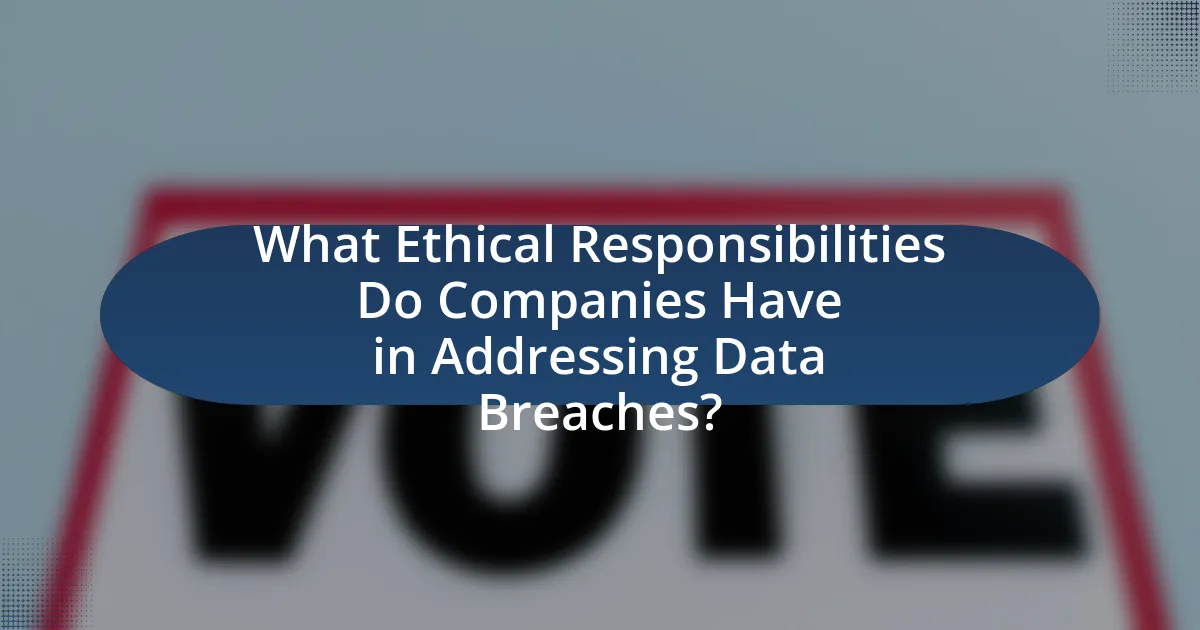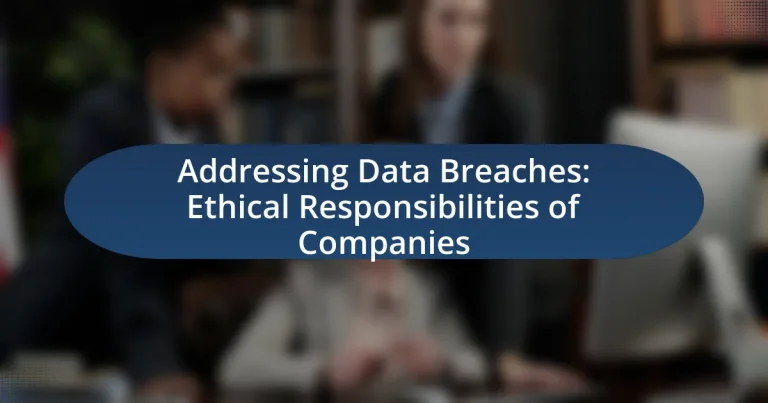Data breaches are incidents where unauthorized individuals access sensitive information, leading to significant financial, reputational, and legal consequences for companies. This article explores the causes of data breaches, including human error and malicious attacks, and highlights the ethical responsibilities companies have in addressing these incidents. It discusses the legal obligations for notifying affected parties, the importance of transparency in communication, and best practices for mitigating risks, such as employee training and incident response planning. Additionally, the article emphasizes the financial impacts of breaches and the necessity for organizations to implement robust cybersecurity measures to protect consumer data and maintain trust.

What are Data Breaches and Their Implications for Companies?
Data breaches are incidents where unauthorized individuals gain access to sensitive data, such as personal information, financial records, or intellectual property. These breaches can lead to significant implications for companies, including financial losses, reputational damage, and legal consequences. For instance, the 2017 Equifax data breach exposed the personal information of approximately 147 million people, resulting in over $4 billion in costs related to legal settlements and security improvements. Additionally, companies may face regulatory fines and increased scrutiny from stakeholders, which can further impact their operations and market position.
How do data breaches occur?
Data breaches occur when unauthorized individuals gain access to sensitive information, typically through methods such as hacking, phishing, or exploiting vulnerabilities in software. For instance, according to the Verizon 2023 Data Breach Investigations Report, 82% of breaches involved a human element, highlighting the significance of social engineering tactics like phishing. Additionally, breaches can result from inadequate security measures, such as weak passwords or unpatched software, which leave systems vulnerable to attacks. The combination of these factors leads to the unauthorized exposure of personal, financial, or proprietary data, underscoring the critical need for robust cybersecurity practices.
What are the common causes of data breaches?
Common causes of data breaches include human error, malicious attacks, and system vulnerabilities. Human error, such as sending sensitive information to the wrong recipient or failing to secure devices, accounts for a significant percentage of breaches, with studies indicating that it is responsible for approximately 30% of incidents. Malicious attacks, including phishing and ransomware, are increasingly prevalent, with the Verizon Data Breach Investigations Report noting that 36% of breaches involved social engineering tactics. Additionally, system vulnerabilities, such as outdated software or unpatched security flaws, can be exploited by attackers, contributing to around 25% of breaches according to the Ponemon Institute’s Cost of a Data Breach Report.
How can human error contribute to data breaches?
Human error significantly contributes to data breaches by creating vulnerabilities that can be exploited by malicious actors. For instance, employees may inadvertently share sensitive information through phishing attacks, where they are tricked into providing login credentials or other confidential data. According to a report by the Ponemon Institute, 23% of data breaches are caused by human error, highlighting the prevalence of this issue. Additionally, mistakes such as misconfiguring security settings or failing to apply software updates can leave systems exposed. These errors underscore the importance of comprehensive training and awareness programs to mitigate risks associated with human behavior in cybersecurity.
Why are data breaches a significant concern for companies?
Data breaches are a significant concern for companies because they can lead to substantial financial losses, reputational damage, and legal consequences. Financially, the average cost of a data breach in 2023 was estimated at $4.45 million, according to the IBM Cost of a Data Breach Report. Reputationally, companies may lose customer trust, resulting in decreased sales and long-term brand damage. Legally, organizations face potential lawsuits and regulatory fines, especially with stringent data protection laws like the GDPR, which can impose penalties of up to 4% of annual global revenue. These factors collectively underscore the critical importance of data security for businesses.
What are the potential financial impacts of a data breach?
A data breach can lead to significant financial impacts for a company, including direct costs such as legal fees, regulatory fines, and compensation to affected customers. According to the 2023 Cost of a Data Breach Report by IBM, the average total cost of a data breach is approximately $4.45 million, which includes expenses related to detection, escalation, notification, and response. Additionally, companies may experience indirect costs such as loss of customer trust, reputational damage, and decreased sales, which can further exacerbate financial losses. The report also highlights that organizations with a strong incident response plan can reduce the cost of a breach by an average of $2.66 million, underscoring the importance of proactive measures in mitigating financial impacts.
How can data breaches affect a company’s reputation?
Data breaches can severely damage a company’s reputation by eroding customer trust and confidence. When sensitive information is compromised, customers often perceive the company as negligent in protecting their data, leading to negative public perception. For instance, a study by the Ponemon Institute found that 75% of consumers would stop purchasing from a company that experienced a data breach. Additionally, companies may face increased scrutiny from regulators and stakeholders, further tarnishing their image. The long-term effects can include loss of business, decreased stock value, and challenges in acquiring new customers, as seen in cases like Equifax, which suffered significant reputational harm following its 2017 breach.

What Ethical Responsibilities Do Companies Have in Addressing Data Breaches?
Companies have a fundamental ethical responsibility to protect customer data and respond transparently to data breaches. This includes promptly notifying affected individuals, offering support such as credit monitoring, and taking steps to prevent future breaches. For instance, the General Data Protection Regulation (GDPR) mandates that organizations report data breaches within 72 hours, emphasizing the importance of timely communication. Additionally, ethical guidelines from organizations like the International Association of Privacy Professionals (IAPP) highlight the necessity for companies to implement robust security measures and maintain accountability for data protection. These responsibilities not only safeguard consumer trust but also align with legal and regulatory standards, reinforcing the ethical obligation to prioritize data security.
What are the legal obligations of companies regarding data breaches?
Companies have legal obligations to notify affected individuals and relevant authorities in the event of a data breach. Under laws such as the General Data Protection Regulation (GDPR) in Europe, companies must report breaches to the appropriate supervisory authority within 72 hours and inform affected individuals without undue delay if there is a high risk to their rights and freedoms. In the United States, various state laws, such as the California Consumer Privacy Act (CCPA), require companies to notify consumers of breaches involving their personal information. These obligations are designed to ensure transparency and protect consumer rights, reflecting the legal framework established to address data privacy and security.
How do data protection laws influence company responsibilities?
Data protection laws significantly influence company responsibilities by mandating the safeguarding of personal data and imposing legal obligations for compliance. Companies are required to implement robust data security measures, conduct regular audits, and ensure transparency in data handling practices. For instance, the General Data Protection Regulation (GDPR) enforces strict guidelines that compel organizations to report data breaches within 72 hours and provide affected individuals with clear information about the breach. Failure to comply can result in substantial fines, reaching up to 4% of annual global turnover or €20 million, whichever is higher. This legal framework not only holds companies accountable for data protection but also enhances consumer trust by promoting ethical data management practices.
What are the consequences of failing to comply with data protection regulations?
Failing to comply with data protection regulations can result in significant legal and financial consequences for organizations. Regulatory bodies may impose hefty fines, which can reach millions of dollars depending on the severity of the violation; for instance, the General Data Protection Regulation (GDPR) allows fines of up to 4% of annual global turnover or €20 million, whichever is greater. Additionally, non-compliance can lead to reputational damage, loss of customer trust, and potential lawsuits from affected individuals, further exacerbating financial losses. These consequences underscore the critical importance of adhering to data protection laws to safeguard both organizational integrity and consumer rights.
How should companies communicate with stakeholders after a data breach?
Companies should communicate transparently and promptly with stakeholders after a data breach. This involves notifying affected individuals about the breach, detailing the nature of the incident, and outlining the steps being taken to mitigate the impact. According to the General Data Protection Regulation (GDPR), organizations are required to inform affected parties within 72 hours of becoming aware of a breach, emphasizing the importance of timely communication. Additionally, companies should provide guidance on protective measures stakeholders can take, such as monitoring accounts for suspicious activity. This approach not only fulfills legal obligations but also helps maintain trust and credibility with stakeholders.
What information should be disclosed to affected parties?
Affected parties should be informed about the nature of the data breach, including what specific data was compromised, the potential risks associated with the breach, and the steps being taken to mitigate those risks. Additionally, companies must disclose the timeline of the breach, how it occurred, and any measures being implemented to prevent future incidents. This transparency is essential for maintaining trust and allowing affected individuals to take necessary precautions, such as monitoring their accounts or changing passwords. Ethical guidelines and legal requirements, such as those outlined in the General Data Protection Regulation (GDPR), mandate that organizations provide this information promptly to ensure affected parties can respond appropriately.
How can transparency build trust with customers post-breach?
Transparency can build trust with customers post-breach by openly communicating the details of the incident, including what data was compromised, how it happened, and the steps being taken to rectify the situation. This approach reassures customers that the company is taking accountability and prioritizing their security. For instance, a study by the Ponemon Institute found that 70% of consumers are more likely to trust a company that is transparent about data breaches. By providing timely updates and clear information, companies can foster a sense of reliability and commitment to protecting customer interests, ultimately restoring confidence in their brand.

What Best Practices Can Companies Implement to Mitigate Data Breaches?
Companies can mitigate data breaches by implementing robust cybersecurity measures, including regular security audits, employee training, and data encryption. Regular security audits help identify vulnerabilities in systems, allowing companies to address weaknesses before they can be exploited. Employee training is crucial, as human error is a leading cause of data breaches; educating staff on recognizing phishing attempts and following security protocols can significantly reduce risks. Data encryption protects sensitive information, making it unreadable to unauthorized users even if accessed. According to the 2021 Verizon Data Breach Investigations Report, 85% of breaches involved a human element, underscoring the importance of comprehensive training and awareness programs.
How can companies enhance their cybersecurity measures?
Companies can enhance their cybersecurity measures by implementing a multi-layered security approach that includes regular software updates, employee training, and robust access controls. Regular software updates ensure that systems are protected against known vulnerabilities, as outdated software is a common entry point for cyberattacks. Employee training is crucial, as human error is a significant factor in data breaches; educating staff on recognizing phishing attempts and safe online practices can reduce risks. Additionally, robust access controls, such as multi-factor authentication and least privilege access, limit the potential for unauthorized access to sensitive data. According to the 2021 Verizon Data Breach Investigations Report, 85% of breaches involved a human element, highlighting the importance of training and awareness in enhancing cybersecurity.
What role does employee training play in preventing data breaches?
Employee training plays a critical role in preventing data breaches by equipping staff with the knowledge and skills necessary to recognize and respond to security threats. Effective training programs raise awareness about phishing attacks, password management, and data handling protocols, which are common vulnerabilities exploited by cybercriminals. According to a report by the Ponemon Institute, organizations that invest in comprehensive security awareness training can reduce the likelihood of a data breach by up to 70%. This statistic underscores the importance of ongoing education and training in fostering a security-conscious culture within organizations, ultimately mitigating risks associated with human error and negligence.
How can regular security audits help identify vulnerabilities?
Regular security audits help identify vulnerabilities by systematically evaluating an organization’s security posture and uncovering weaknesses in its systems and processes. These audits involve comprehensive assessments of hardware, software, and network configurations, which can reveal outdated systems, misconfigurations, and compliance gaps. For instance, a study by the Ponemon Institute found that organizations conducting regular security audits experienced 50% fewer data breaches compared to those that did not. This demonstrates that proactive identification of vulnerabilities through audits significantly enhances an organization’s ability to mitigate risks and protect sensitive data.
What proactive steps can companies take to prepare for potential breaches?
Companies can prepare for potential breaches by implementing a comprehensive cybersecurity strategy that includes regular risk assessments, employee training, and incident response planning. Regular risk assessments help identify vulnerabilities in systems and processes, allowing companies to address weaknesses before they can be exploited. Employee training is crucial, as human error is a leading cause of data breaches; educating staff on security protocols and phishing awareness can significantly reduce risks. Additionally, having a well-defined incident response plan ensures that companies can quickly and effectively respond to breaches, minimizing damage and recovery time. According to the Ponemon Institute’s 2021 Cost of a Data Breach Report, organizations with an incident response team can reduce the cost of a breach by an average of $2 million, highlighting the importance of proactive measures.
How can incident response plans minimize damage during a breach?
Incident response plans minimize damage during a breach by providing a structured approach to identifying, managing, and mitigating the effects of the incident. These plans outline specific roles, responsibilities, and procedures that enable organizations to respond swiftly and effectively, thereby reducing the potential impact on data integrity and customer trust. For instance, a study by the Ponemon Institute found that organizations with an incident response plan can reduce the average cost of a data breach by approximately $1.23 million compared to those without a plan. This demonstrates that having a well-defined response strategy not only facilitates quicker containment and recovery but also lessens the financial and reputational repercussions associated with data breaches.
What are the benefits of investing in cybersecurity insurance?
Investing in cybersecurity insurance provides financial protection against losses resulting from data breaches and cyberattacks. This type of insurance helps cover costs associated with incident response, legal fees, regulatory fines, and public relations efforts to mitigate reputational damage. According to a report by the Ponemon Institute, the average cost of a data breach in 2021 was $4.24 million, highlighting the significant financial risk companies face without such coverage. Additionally, cybersecurity insurance can facilitate access to expert resources and services that aid in preventing future incidents, further enhancing a company’s overall cybersecurity posture.
What are the key takeaways for companies in addressing data breaches ethically?
Companies must prioritize transparency, accountability, and proactive communication when addressing data breaches ethically. Transparency involves promptly informing affected stakeholders about the breach, including the nature of the data compromised and the potential risks involved. Accountability requires companies to take responsibility for the breach, implementing measures to prevent future incidents and ensuring compliance with relevant regulations, such as the General Data Protection Regulation (GDPR), which mandates timely notification of breaches. Proactive communication entails providing clear guidance to affected individuals on steps they can take to protect themselves, thereby fostering trust and demonstrating a commitment to ethical practices. These approaches not only mitigate reputational damage but also align with ethical standards and legal obligations, reinforcing the importance of integrity in data management.





